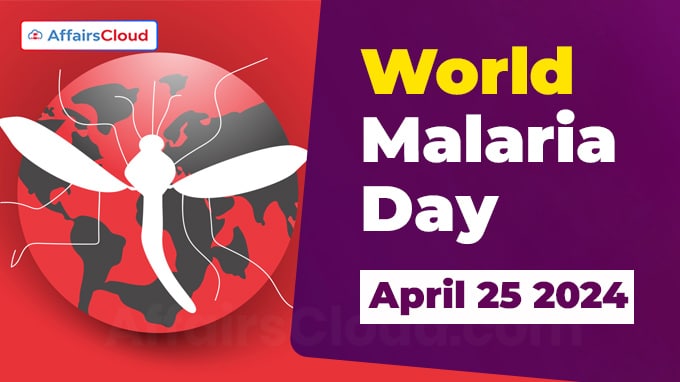
- WMD is an occasion to highlight the need for continued investment and sustained political commitment to prevent and control malaria.
The World Health Organisation (WHO) leads the annual observance of WMD
Theme:
The theme of WMD 2024 is “Accelerating the fight against malaria for a more equitable world”.
- The 2024 theme focused on ensuring equitable access to malaria interventions and information.
Background:
i.World Malaria Day was instituted by WHO member states during the World Health Assembly (WHA) of 2007.
ii.The 1st World Malaria Day was observed on 25 April 2008.
Roots of WMD:
i.The concept of WMD stems from Africa Malaria Day, initiated in 2001 by African countries.
ii.It originated after the Abuja Declaration in 2001, signed by 44 malaria-endemic countries at the African Summit on Malaria.
New Operational Strategy:
i.Ahead of WMD 2024, the WHO GMP released a new operational strategy, “Global Malaria Programme Operational Strategy 2024-2030“, to reshape the trajectory of malaria trends worldwide up to 2030.
ii.Strategic objectives:
- Develop and disseminate norms and standards;
- Stimulate the development and timely introduction of new tools and innovation;
- Promote the use of strategic information for impact;
- Provide technical leadership in the global malaria response
2024 Observance:
i.On WMD 2024, WHO joined the RBM Partnership to End Malaria and other partners in addressing barriers to health equity, gender equality, and human rights in malaria responses worldwide.
ii.In response to the ongoing challenge, the RBM Partnership to End Malaria has chosen the theme for WMD 2024: Gender, Health Equity, and Human Rights.
About Malaria:
i.Malaria is an acute febrile illness caused by Plasmodium parasites, which are spread to people through the bites of infected female Anopheles mosquitoes.
ii.Malaria is a life-threatening disease primarily found in tropical countries and it is both preventable and curable.
Transmission:
i.Malaria isn’t contagious and cannot spread from one person to another.
ii.5 species of parasites can cause malaria in humans. 2 of these species – Plasmodium falciparum and Plasmodium vivax – pose the greatest threat
iii.Around 40 out of the 400 Anopheles species are known to transmit the Malaria.
Vaccine:
As of 2 October 2023, both RTS,S/AS01, and R21/Matrix-M vaccines are recommended by WHO to prevent malaria in children.
- RTS,S is the 1st malaria vaccine recommended by the WHO in October 2021 for children living in areas with moderate and high transmission of malaria.
Points to note:
i.In 2022, there were 249 million malaria cases globally that led to 608,000 deaths in total. Around 76% of this are children under 5 years of age.
- WHO African Region accounts for 94% of malaria cases and 95% of deaths.
ii.The WHO Global Malaria Programme (GMP) spearheads global efforts to control and eliminate malaria. Its work is guided by the Global Technical Strategy for Malaria (GST) 2016–2030 adopted by the WHA in May 2015 and updated in 2021.
iii.The GTS aims to reduce malaria case incidence and mortality rates by 75% by 2025 and by 90% by 2030 from the 2015 baseline.
- Despite progress since 2000, current trends indicate potential setbacks, and the GTS 2025 targets will not be achieved globally.
About World Health Organization (WHO):
Director-General (DG)- Dr. Tedros Adhanom Ghebreyesus
Headquarters– Geneva, Switzerland
Established on– 7 April 1948